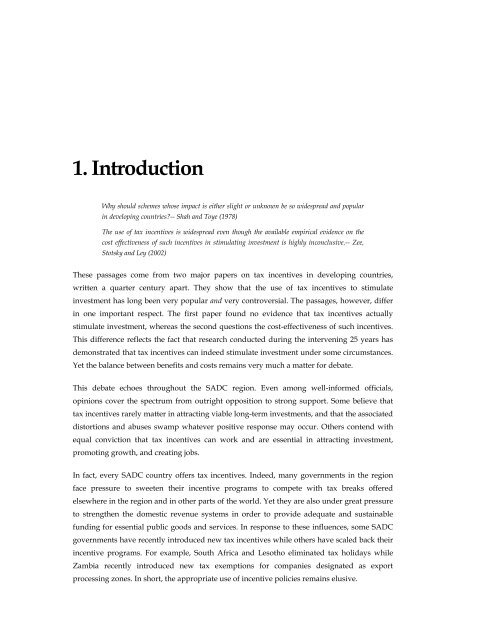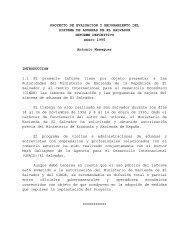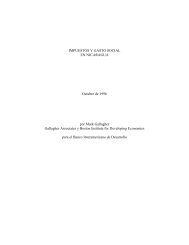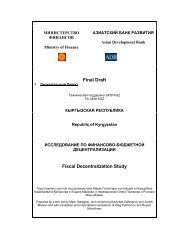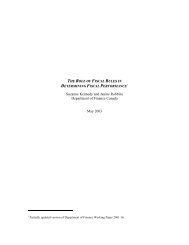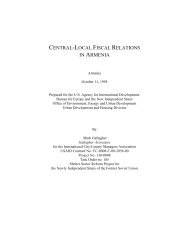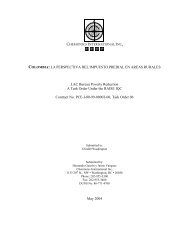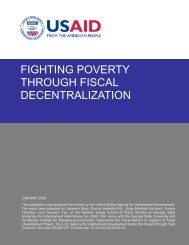Effectiveness and Economic Impact of Tax Incentives in the SADC ...
Effectiveness and Economic Impact of Tax Incentives in the SADC ...
Effectiveness and Economic Impact of Tax Incentives in the SADC ...
Create successful ePaper yourself
Turn your PDF publications into a flip-book with our unique Google optimized e-Paper software.
1. Introduction<br />
Why should schemes whose impact is ei<strong>the</strong>r slight or unknown be so widespread <strong>and</strong> popular<br />
<strong>in</strong> develop<strong>in</strong>g countries?-- Shah <strong>and</strong> Toye (1978)<br />
The use <strong>of</strong> tax <strong>in</strong>centives is widespread even though <strong>the</strong> available empirical evidence on <strong>the</strong><br />
cost effectiveness <strong>of</strong> such <strong>in</strong>centives <strong>in</strong> stimulat<strong>in</strong>g <strong>in</strong>vestment is highly <strong>in</strong>conclusive.-- Zee,<br />
Stotsky <strong>and</strong> Ley (2002)<br />
These passages come from two major papers on tax <strong>in</strong>centives <strong>in</strong> develop<strong>in</strong>g countries,<br />
written a quarter century apart. They show that <strong>the</strong> use <strong>of</strong> tax <strong>in</strong>centives to stimulate<br />
<strong>in</strong>vestment has long been very popular <strong>and</strong> very controversial. The passages, however, differ<br />
<strong>in</strong> one important respect. The first paper found no evidence that tax <strong>in</strong>centives actually<br />
stimulate <strong>in</strong>vestment, whereas <strong>the</strong> second questions <strong>the</strong> cost-effectiveness <strong>of</strong> such <strong>in</strong>centives.<br />
This difference reflects <strong>the</strong> fact that research conducted dur<strong>in</strong>g <strong>the</strong> <strong>in</strong>terven<strong>in</strong>g 25 years has<br />
demonstrated that tax <strong>in</strong>centives can <strong>in</strong>deed stimulate <strong>in</strong>vestment under some circumstances.<br />
Yet <strong>the</strong> balance between benefits <strong>and</strong> costs rema<strong>in</strong>s very much a matter for debate.<br />
This debate echoes throughout <strong>the</strong> <strong>SADC</strong> region. Even among well-<strong>in</strong>formed <strong>of</strong>ficials,<br />
op<strong>in</strong>ions cover <strong>the</strong> spectrum from outright opposition to strong support. Some believe that<br />
tax <strong>in</strong>centives rarely matter <strong>in</strong> attract<strong>in</strong>g viable long-term <strong>in</strong>vestments, <strong>and</strong> that <strong>the</strong> associated<br />
distortions <strong>and</strong> abuses swamp whatever positive response may occur. O<strong>the</strong>rs contend with<br />
equal conviction that tax <strong>in</strong>centives can work <strong>and</strong> are essential <strong>in</strong> attract<strong>in</strong>g <strong>in</strong>vestment,<br />
promot<strong>in</strong>g growth, <strong>and</strong> creat<strong>in</strong>g jobs.<br />
In fact, every <strong>SADC</strong> country <strong>of</strong>fers tax <strong>in</strong>centives. Indeed, many governments <strong>in</strong> <strong>the</strong> region<br />
face pressure to sweeten <strong>the</strong>ir <strong>in</strong>centive programs to compete with tax breaks <strong>of</strong>fered<br />
elsewhere <strong>in</strong> <strong>the</strong> region <strong>and</strong> <strong>in</strong> o<strong>the</strong>r parts <strong>of</strong> <strong>the</strong> world. Yet <strong>the</strong>y are also under great pressure<br />
to streng<strong>the</strong>n <strong>the</strong> domestic revenue systems <strong>in</strong> order to provide adequate <strong>and</strong> susta<strong>in</strong>able<br />
fund<strong>in</strong>g for essential public goods <strong>and</strong> services. In response to <strong>the</strong>se <strong>in</strong>fluences, some <strong>SADC</strong><br />
governments have recently <strong>in</strong>troduced new tax <strong>in</strong>centives while o<strong>the</strong>rs have scaled back <strong>the</strong>ir<br />
<strong>in</strong>centive programs. For example, South Africa <strong>and</strong> Lesotho elim<strong>in</strong>ated tax holidays while<br />
Zambia recently <strong>in</strong>troduced new tax exemptions for companies designated as export<br />
process<strong>in</strong>g zones. In short, <strong>the</strong> appropriate use <strong>of</strong> <strong>in</strong>centive policies rema<strong>in</strong>s elusive.


